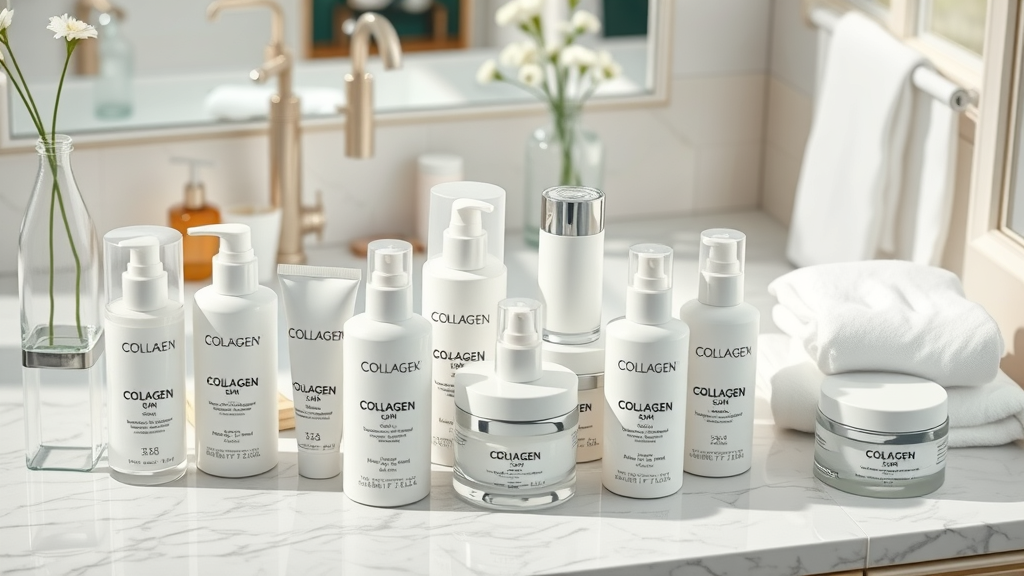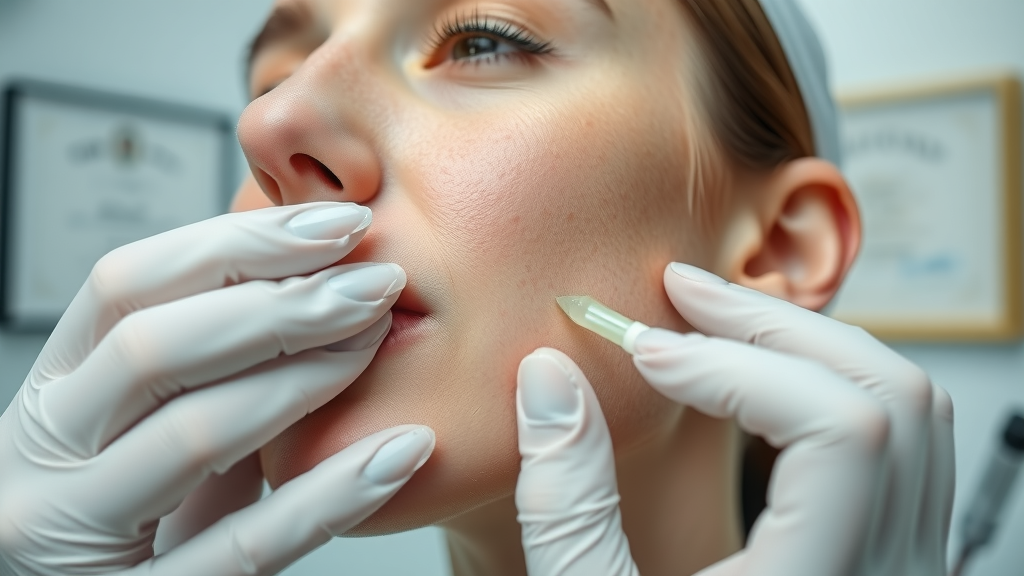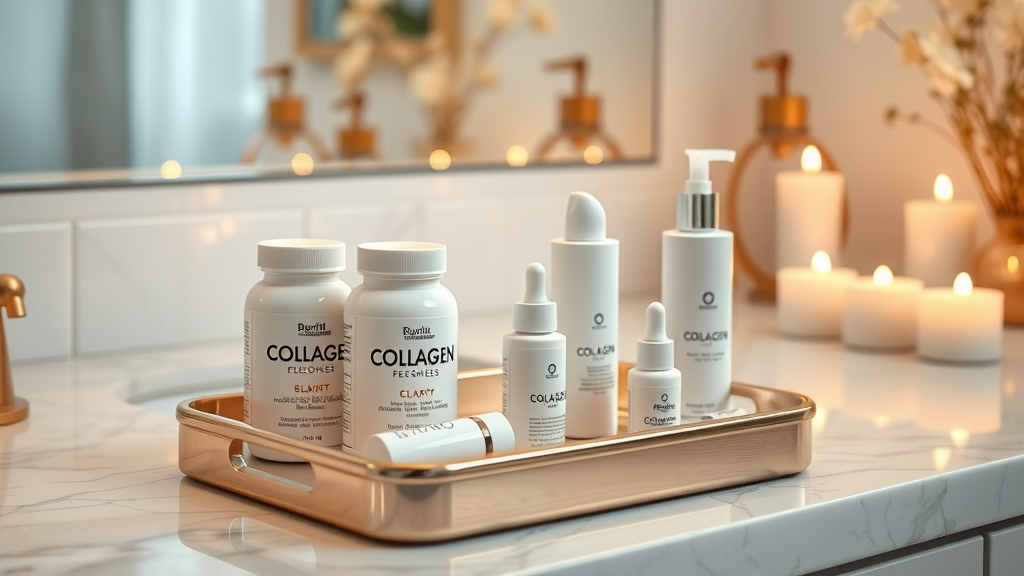
Did you know that after the age of 25, your body loses about 1% of its collagen every year—impacting skin firmness and elasticity? Understanding collagen for skin care could transform your approach to beauty.
Why Collagen for Skin Care Is Trending—and Should You Pay Attention?
- Collagen’s role in skin care
- My personal stance on collagen supplements and products
- Essential facts & the latest science
- Cautions, myths, and real-world recommendations

Over the last decade, collagen for skin care has exploded in popularity, with influencers and dermatologists alike weighing in on powdered drinks, glowing serums, and daily supplements. The reason? Collagen is the most abundant protein in your body, giving skin its firmness and bounce. As collagen production slows with age, many seek out topical treatments and collagen supplements to keep skin healthy, fight fine lines, and maintain a youthful glow. But is all the hype justified—or just clever marketing? In this article, I’ll share my personal experience, break down the science, and help you decide if collagen is right for your skin care routine .
From my own experiment with supplementing collagen to the essential facts and side effects you need to know, I’ll cut through the noise and ground you in what works (and what doesn’t) for healthy, happy skin. Grab your favorite moisturizer and let’s dive into the real story behind collagen for skin care .
How Collagen for Skin Care Works: The Science and the Claims
Collagen serves as the building block for the skin’s structure, forming a dense network in the deeper layers called the dermis. As you age—or with repeated exposure to UV rays —your body naturally produces less collagen, leading to visible signs of skin aging such as wrinkles and reduced skin elasticity . Companies now market topical collagen (applied to skin), oral collagen supplements , and collagen peptides for the promise of brighter, firmer skin. But, not every collagen product works the same, and absorption rates differ significantly.
Let’s look at the science: Topical products may offer short-term hydration but struggle to penetrate deep skin layers. Oral collagen , including powders and capsules, are broken down into amino acids by the digestive system, some of which the body may use to rebuild its own collagen. Collagen peptide powders—hydrolyzed for better absorption—are touted as the most effective, with some studies suggesting they can support the skin’s structure and minimize fine lines if used consistently. Understanding how each method works is key to choosing the right approach for your care routine .
| Collagen Type | Source | Absorption Rate | Primary Benefit |
|---|---|---|---|
| Topical Collagen | Creams/Serums | Low | Instant hydration |
| Oral Collagen | Supplements | Higher | Systemic improvement |
| Collagen Peptides | Powders | Highest | Boosts collagen synthesis |
Collagen for Skin Care vs. Collagen Supplementation: My Opinion
“While collagen supplements are everywhere, not all are backed by science or dermatologists. Choose wisely—your skin’s health depends on it.”
As someone skeptical of skin trends, I decided to test both topical collagen and oral collagen supplements . From my experience and my research, oral collagen provided the most noticeable change, resulting in improved skin hydration and softer, more elastic skin after a couple of months. While creams made my skin feel smooth instantly, long-term improvements were most credible with collagen peptides. But I urge you: look for products with real clinical backing and steer clear of vague claims or sketchy sourcing.
Both methods aren’t magic bullets. The benefits of collagen supplements are best seen as part of a well-rounded routine that includes sunscreen, antioxidants, and a focus on nutrition. Collagen can help—but it won’t replace the basics of good skin care. Always check with your dermatologist before introducing new supplements.
How I Added Collagen Supplements to My Skin Care Routine—and What Happened

- Finding a reputable collagen supplement
- Sticking to a daily routine
- Noticing changes in elasticity and skin tone
- Monitoring for side effects or irritation
My journey began by researching reputable brands with third-party testing and clear ingredient lists. I chose a hydrolyzed collagen peptide powder sourced from marine collagen, which is known for its high bioavailability. I mixed it into my morning smoothie every day for two months. The key to taking collagen is consistency—most research suggests at least eight weeks of use for visible effects.
Over time, I noticed a tangible difference in my skin’s firmness and moisture retention. My skin felt less “tired” and saw a subtle reduction in fine lines and dullness. Importantly, I kept watch for side effects such as digestive upset or skin irritation, which are rare but possible. In my case, I experienced none. This experiment reinforced my belief that while collagen is not a cure-all, high-quality supplements—used properly—can deliver real benefits for aging skin.
Understanding the Types of Collagen for Skin Care Products
Types of Collagen Used in Skin Care—And Which Ones Matter
- Type I (skin, hair, nails)
- Type II (joints)
- Type III (skin and organs)

Not all types of collagen have the same impact on skin health. The majority of collagen products for beauty are formulated with Type I collagen , as it’s the primary form found in skin, hair, and nails, supporting firmness and resilience. Type III also plays a supporting role in connective tissue of skin and organs, aiding repair and plumpness. Type II is most often associated with joint health, making it useful for overall wellness but less critical for skin care.
When selecting a collagen product, read the label to confirm the type—and source (marine for skin, bovine for joints)—matches your goals. Products labeled “hydrolyzed” or as “collagen peptides” are broken down for better absorption. Don’t be swayed by trendy labeling; the form and type of collagen matter for the final result you see in your skin.
Topical Collagen, Oral Collagen, and Collagen Peptides: Do They Deliver Results?
What Science Says About Topical Collagen Products for Skin Care

Topical collagen creams and serums promise to hydrate and plump the skin’s surface. These products offer **quick, visible results** in smoothness—primarily because they lock in moisture. However, clinical research from institutions like the **Cleveland Clinic** suggests that topical collagen can’t penetrate the deeper dermal layers where genuine collagen production happens. Instead, topical products act as a powerful **moisturizing shield**, temporarily softening fine lines and improving skin’s radiance, but they can’t jumpstart your internal collagen synthesis.
Some newer formulations are attempting to enhance penetration with advanced peptides or delivery systems, but current science is clear—if you’re looking for lasting effects on aging skin , topical collagen is best paired with proven ingredients like retinol or vitamin C. For deep skin transformation, internal supplementation—and stimulating natural collagen production—offers a more robust route.
Can Oral Collagen Work for Your Skin Care Routine?
Oral collagen —ingested as powders, pills, or drinks—has shown increasing scientific promise. Once consumed, these supplements break down into amino acids and small peptides, which may be used by the body to produce new collagen fibers. Several small studies indicate improvements in skin hydration , skin elasticity , and overall skin health with regular use of high-quality collagen peptides. Clinical data reveal that benefits typically become measurable after eight to twelve weeks of continued use—so patience pays off.
Remember, results can vary based on the quality of the product and your unique biology. For best results, choose supplements marked as “hydrolyzed collagen” or “collagen hydrolysate,” which have been broken down for better bioavailability . If you’re investing in oral collagen, also focus on a nutrient-rich diet, good hydration, and sun protection for maximum synergy.
Why Collagen Peptides Are Buzzing in Skin Care Circles
Collagen peptides —often called hydrolyzed collagen—are collagen molecules broken down into smaller chains, making them easier for the body to absorb and use. These are at the center of the collagen supplement trend, with many dermatologists and researchers noting stronger bioavailability and clinical evidence compared to older, larger-collagen molecule formulations. Peptide powders, in particular, mix into drinks with minimal taste and can quickly become part of any skincare routine .
What sets collagen peptides apart is their demonstrated ability to stimulate the body’s own collagen production . Several studies suggest they may help strengthen skin structure, minimize the appearance of fine lines, and improve skin’s “bounce.” Remember—the best collagen peptide products are widely tested, clearly labeled, and backed by published research.
Collagen for Skin Care and the Aging Process: Slow Down the Clock?
“No single ingredient stops aging, but collagen supplements can play a real role in supporting your skin’s youthfulness—if used consistently.” —Cleveland Clinic
One of the most compelling reasons people turn to collagen for skin care is its potential to slow visible skin aging. Collagen forms a critical part of the skin’s connective tissue matrix, providing structure, elasticity, and resistance to wrinkles. As your body naturally loses collagen with age, aging skin becomes more prone to sagging, dullness, and the formation of fine lines .
Scientific research suggests that regular supplementation with quality collagen peptides may help slow the tissue breakdown of the **aging process** and support skin’s youthful characteristics—especially when combined with a healthy lifestyle and protective habits like sunscreen use. While no product will completely halt aging, collagen’s role in renewal and repair makes it a valuable ally.
Potential Side Effects of Collagen for Skin Care and Supplements
- Allergic reactions (rare)
- Digestive upset
- Unregulated additives
Most people tolerate collagen supplements well, but there are a few caveats to remember. Rarely, users report adverse reactions such as mild digestive issues (bloating, fullness, or upset stomach) when starting a new collagen product. Because collagen is often derived from animal sources (marine or bovine), there’s a risk of allergic response if you have sensitivities.
The booming market for collagen has unfortunately led to poorly regulated products. Always check for third-party testing and transparency about ingredients to minimize risk from unlisted additives. When in doubt, seek medical advice—especially if you experience any unexpected adverse effects.
Navigating the Hype: Dermatologist Views on Collagen Supplements for Skin Care

What Does the Cleveland Clinic Say About Collagen Supplement Benefits?
“Supplements may boost your collagen, but always pair them with a balanced diet and sun protection.” —Dermatology expert
If you’re overwhelmed by influencer endorsements and skincare ads, take a cue from leading medical voices. Experts at the Cleveland Clinic agree that, while collagen supplements show promise in improving skin elasticity and hydration, results are most pronounced when paired with a healthy lifestyle. Sunscreen is still the most important step to protect your skin and prevent the breakdown of your natural collagen from UV rays.
Dermatologists also remind consumers that while supplements may offer a boost, they shouldn't replace a nutrient-dense diet, smart sun protection, and time-proven skincare basics. The bottom line? Collagen is a potentially helpful adjunct, but overblown claims should always be met with healthy skepticism.
How to Choose the Best Collagen Product for Your Personalized Skin Care Routine
- Sourcing (marine vs. bovine)
- Third-party testing
- Reviews and scientific backing
Selecting a collagen product can feel daunting. Start by checking the source: marine collagen is typically preferred for beauty, while bovine is good for joint and general wellness. Make sure products are third-party tested for purity and efficacy. Unbiased reviews and clinical studies lend credibility—always seek evidence over hype. Beware of products with added fillers, sugars, or flavorings, which can interfere with results or cause unexpected side effects .
Ultimately, the best collagen for skin care is one that fits your needs, budget, and lifestyle. A simple, hydrolyzed collagen peptide supplement from a trustworthy brand is a sensible starting point for most. If you have allergies or are vegetarian, seek out alternatives like vegan “collagen boosters” formulated with amino acids that support natural collagen production.
FAQs on Collagen for Skin Care—Quick Answers to Your Collagen Questions
Is collagen good for your skincare?
Expert insight: Collagen can support skin hydration and elasticity, but it’s most effective alongside a comprehensive skincare routine and healthy lifestyle. Results may vary from person to person.
Which is better, retinol or collagen?
Expert insight: Retinol and collagen serve different purposes. Retinol promotes cell turnover and collagen production, while collagen supplements nourish from within. For best results, many dermatologists recommend using both in a balanced skincare routine.
What is the best collagen product for skin?
Expert insight: The best collagen product depends on individual needs. Hydrolyzed collagen peptides with proven bioavailability and third-party testing are usually most effective for skin improvement.
What do dermatologists say about collagen?
Expert insight: Dermatologists highlight that collagen supplementation can be a useful adjunct for skin care but emphasize the importance of a holistic routine, including sun protection, healthy diet, and evidence-based topical products.
Expert Answers: Everything Else You Want to Know About Collagen for Skin Care
If you’re still curious, remember that not all collagen supplements are the same. Always ask your dermatologist or skin care professional about what’s best for your unique needs and seek clinical-grade products when possible for safety and results.
Top Takeaways: Should You Incorporate Collagen for Skin Care Into Your Daily Routine?

- Collagen for skin care has real scientific backing, but results vary
- Best used as part of a holistic skin care routine, including sunscreen and hydration
- Not all collagen products are created equal—research before buying
Start Your Collagen for Skin Care Journey Today

- Ready to see the difference for yourself? Start your journey to better hair and skin health—with CollaGenius. Click here now!
People Also Ask About Collagen for Skin Care
Is collagen good for your skincare?
Expert insight: Collagen can support skin hydration and elasticity, but it’s most effective alongside a comprehensive skin care routine and healthy lifestyle. Results may vary from person to person.
Which is better, retinol or collagen?
Expert insight: Retinol and collagen serve different purposes. Retinol promotes cell turnover and collagen production, while collagen supplements nourish from within. For best results, many dermatologists recommend using both in a balanced skin care routine.
What is the best collagen product for skin?
Expert insight: The best collagen product depends on individual needs. Hydrolyzed collagen peptides with proven bioavailability and third-party testing are usually most effective for skin improvement.
What do dermatologists say about collagen?
Expert insight: Dermatologists highlight that collagen supplementation can be a useful adjunct for skin care but emphasize the importance of a holistic routine, which includes sun protection, healthy diet, and evidence-based topical products.
Conclusion
For real results, align collagen for skin care with a holistic regimen—use sunscreen, eat well, stay hydrated, and research collagen products before adding them to your daily routine.
 Add Element
Add Element  Add Row
Add Row 



Write A Comment